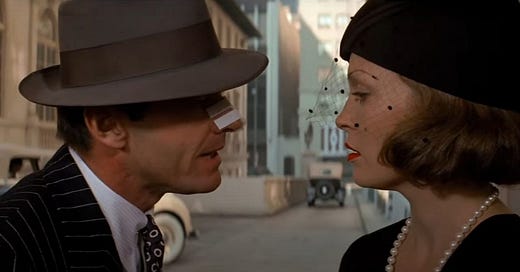Chinatown: 50 Years On
After half a century, Robert Towne and Roman Polanski’s neo-noir masterpiece remains bitingly relevant
Warning: Contains spoilers.
When originally released in 1974, Chinatown provided an appropriate reflection of the American national mood. This was a country reeling from the Watergate scandal, a nation wearying of political and corporate corruption, and a land still embroiled in the quagmire of the Vietnam War. Amid this turbulent backdrop, the Chinatown finale, in which the villain goes free despite truly heinous crimes, felt appropriate. Previously in noir mystery thrillers, the antagonist was caught and punished by genre convention. Yet the decision by screenwriter Robert Towne and director Roman Polanski to break that convention was a stroke of artistic genius. “Forget it, Jake. It’s Chinatown,” became a cynical shrug that mirrored contemporary events. For 1974 audiences, it made depressing sense.
I’ll return to the resonant brilliance of the finale in a moment, but it’s worth stating upfront that even without this bleak resolution, Chinatown is a masterpiece of densely plotted noir. There’s a reason Robert Towne’s screenplay is a candidate for the greatest ever written, and whilst I wouldn’t necessarily go that far, I’d certainly put it in the top five. In short, Towne deserves as much credit as Polanski for crafting this classic thriller.
Keep reading with a 7-day free trial
Subscribe to The Dillon Empire: Simon Dillon on Substack to keep reading this post and get 7 days of free access to the full post archives.





